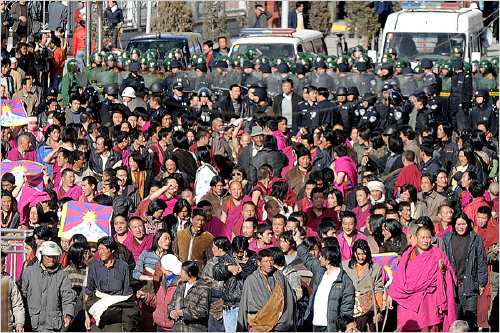This fine looking gentleman is Yu Keping. He is a ranking Communist Party official in charge of the Central Compilation and Translation Bureau, an obscure agency dedicated to translating works by Chinese leaders and Marxist tracts from around the world. He also runs a policy research organization, China Center for Comparative Politics and Economics, that provides advice to China’s leadership. He also advocates for democracy and rule of law in China in such a way that has not threatened the ruler's view of themselves. As the New York Times put it, 'Advocating democracy in a single-party, authoritarian state would seem to be a fool’s errand. [For example,] Wei Jingsheng, one of China’s most ardent pro-democracy dissidents, spent over a decade in jail for demanding multiparty elections. Last year, the writer Liu Xiaobo was given an 11-year sentence after he wrote a manifesto calling for an end to the Chinese Communist Party’s hold on power.' But Yu has been able to state a case for change, and yet prosper in front of China's rulers.
So what's up with Yu? Even China leadership and dissidents can't decide. Some say he's a shill, a front man for China's government, someone putting a nice face on ideas for a future never to be realized. Others say he represents a deepening segment of China's society that can't be ignored. Again, the NY Times, 'Mr. Yu was a teacher at Peking University during the spring of 1989, and he said he went to Tiananmen Square several times to look after his students, who were part of the throngs protesting corruption and inflation and demanding democratic reforms. “I was so worried about them,” he said, recalling the denouement — a bloody military crackdown in which hundreds died — as “a regrettable tragedy.” But he said those events taught him that China must have legal avenues for its citizens to express their disdain for injustice, or their desire for change. “In any nation, when people are demanding reform, this is a sign of prosperity,” he said. “To ignore these demands is to invite instability.”
Mr. Yu said he was impressed by the United States, where he was a visiting scholar at Duke University. He relishes memories of the intellectual give-and-take in the classroom and the unencumbered vigor of the news media. “I really loved the American can-do spirit, the values of equality and justice, and the way people cared about the environment...”
Yu's statements represent the ferment inside China as it continues its economic growth and rising living standards (at least for some of its population). A harsher aspect of Chinese internal politics is its continued intentional migration of ethnic Han Chinese into Tibet, with confrontation and repression of ethnic Tibetans being synonymous with its presence there.
 Ethnic Tibetans protest in the face of firm Chinese resolve
Ethnic Tibetans protest in the face of firm Chinese resolveAs to China's foreign policy, tensions are always near when it comes to US. Hillary Clinton angered China recently when she offered our country's expertise when it came to sorting out claims by Vietnam, the Philippines and other SouthEast Asian countries over an island chain called the Spratleys.

Claimed unilaterally by China, many of the islands are just rocks or spits of sand, but they are rich in oil and natural gas deposits, and China views them as important outposts that extend its territorial waters far into the busy shipping lanes in the sea. In contrast, “The United States has a national interest in freedom of navigation, open access to Asia’s maritime commons and respect for international law in the South China Sea,” Mrs. Clinton said. The announcement was a significant victory for the Vietnamese, who have had deadly clashes in past decades with China over some of the islands, as well as over another group of island called the Paracels.
Vietnam’s strategy has been to try to “internationalize” the disputes by bringing in other players for multilateral negotiations. At this conference with 27 nations, 12 supported an international challenge to the Chinese claim of sovereignty. The US administration’s decision to get involved appeared to catch China flat-footed and angered its foreign minister, Yang Jiechi, at a time when the country is already on edge over naval exercises the United States and South Korea will hold starting this weekend off the Korean Peninsula.
China's relationship with the US is clearly complicated - we're one of its largest consumers of domestic goods - critical for its growing domestic economy. At the same time, China has assisted the US in buying up large amounts of our debt (our deficit spending each year). Similar to China's approach to Tibet - as a troublesome province, not an independent nation - it insists that Taiwan is also a province that eventually must be reunited, while the West says remains vague (in both cases). North Korea as an ally is more of an albatross round China's neck due to its belligerency with much of the world, and the South Korean/US alliance looks mighty prosperous in comparison.
Yet the world is clearly engaging the new China, economically and culturally, if with concerns politically. Last year's summer Olympics in China were well run and a reminder of the diversity (and showmanship) of the country. It is not surprising that both promise and difficulties characterize this nation's place in world affairs.

No comments:
Post a Comment